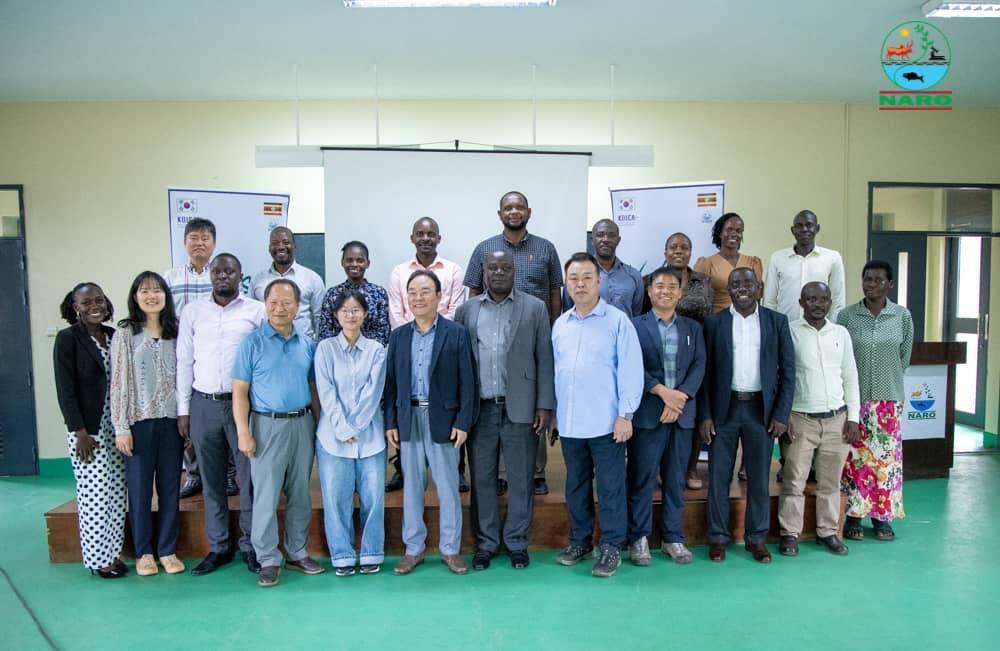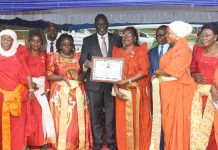Africa-Press – Uganda. Uganda and the Republic of Korea have recorded significant progress under the ongoing VegeSeed project, a joint initiative aimed at strengthening Uganda’s vegetable seed system through research, breeding, and capacity building.
During a breeders’ meeting held on Tuesday at the Cereals Training Hall at National Crops Resources Research Institute (NaCRRI), Namulonge, project scientists and partners reviewed key achievements and ongoing work in developing improved vegetable varieties for Ugandan farmers.
The meeting brought together representatives from the Korean Embassy, KOICA, NARO breeders, NSCS personnel, Korean experts, NaCRRI staff, and MuZARDI scientists.
It focused on assessing progress in breeding the project’s target crops, tomato, nakati, chili pepper, pumpkin, and onion, and planning for upcoming National Performance Trials (NPTs).
The VegeSeed project is a flagship agricultural collaboration between the Government of Uganda and the Republic of Korea, implemented by the National Agricultural Research Organisation (NARO) with support from the Korea International Cooperation Agency (KOICA).
Launched in 2022, the eight-year programme seeks to develop high-quality, locally adapted vegetable varieties to reduce seed imports, improve productivity, and enhance food security.
Speaking at the meeting, Dr Gabriel Ddamulira, Principal Research Officer at NARO, said the project has made solid progress and is now halfway through its implementation.
“This VegeSeed project is an initiative under the Uganda government and the Korean government to improve on vegetable seed availability and access to farmers throughout the country. We are dealing with five commodities, onion, nakati, pepper, tomato, and pumpkin,” Dr Ddamulira said.
He added that the meeting served as part of routine monitoring to evaluate how much progress has been made in breeding and variety development.
“Today’s meeting was to assess the progress in terms of what we’ve done in breeding or variety development. These are routine monitoring workshops to assess how far the project has gone and how far we’ve delivered on our outputs,” he noted.
Dr Ddamulira highlighted that the project has already improved research capacity through infrastructure development and training.
“Under this project, we have been able to acquire research infrastructure like equipping our labs and getting new machines, which facilitate variety development. It used to take many years to release a variety, but with these facilities, we are able to shorten that time,” he explained.
He further said that the project has enabled several Ugandan scientists and technicians to receive advanced training in Korea and the World Vegetable Center in Tanzania, helping to strengthen the country’s breeding expertise.
“We have sent teams to Korea and to the World Vegetable Center in Tanzania to learn modern breeding techniques. So in terms of research, we’ve really benefited in terms of human and infrastructure capacity building,” he said.
The project’s total budget stands at about USD 8 million, with the Government of Uganda contributing USD 2 million in kind.
During the meeting, Dr Idd Ramathani, the pumpkin breeder, outlined the breeding goals aimed at developing improved pumpkin varieties with multiple benefits.
“We are focusing on varieties which are drought tolerant, resilient to high temperature and salinity, and rich in beta-carotene and dry matter content,” he said.
He explained that pumpkins with high beta-carotene content could help address vitamin A deficiency among children and pregnant women, while high dry matter content would make pumpkins firmer and more suitable for processing.
“We also want to improve the seed quantity to produce oil from pumpkin seeds, which has pharmaceutical and health benefits,” he added.
Rachael Nalugo, the Nakati breeder, also shared updates on the crop’s breeding progress.
“We have done some selection and identified potential variants for the next breeding level. We are now observing performance and focusing on developing high-yielding, antioxidant-rich hybrids,” she said.
In his remarks, Dr Jee Hyeong, President of KEADI, commended the teams for their efforts but urged them to stay on schedule.
“Climate change is a global issue, and seed is key to climate-smart agriculture. We must ensure productivity and develop varieties that can withstand drought and other extremes,” he said.
“This project will end in 2029, so by 2027 or 2028, we should have certified seed ready for farmers. Let’s keep the timeline and ensure the whole seed value chain, from breeding to production, is completed,” he added.
Experts say the VegeSeed project remains a vital partnership in enhancing Uganda’s capacity to produce quality vegetable seed locally, positioning the country to become more self-reliant and resilient in its agricultural systems.
For More News And Analysis About Uganda Follow Africa-Press






